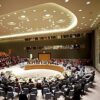The African Development Bank Group (AfDB) has approved an initiative aimed at tackling the challenge of hazardous chemicals in 11 Least Developed Countries (LDCs) in Africa.
In a statement issued on Saturday, the AfDB highlighted that the initiative would address chemicals such as Persistent Organic Pollutants (POPs) and mercury.
The project, titled ‘Scaling-up Investment and Technology Transfer to Facilitate Capacity Strengthening and Technical Assistance for the Implementation of Stockholm and Minamata Conventions in African LDCs – Phase 2’ (AFLDC-2), focuses on improving chemicals and waste management across 11 African Least Developed Countries (LDCs).
These countries include Angola, Ethiopia, the Gambia, Guinea, Liberia, Mauritania, Senegal, Sierra Leone, Togo, Uganda, and Zambia.
This initiative, the first of its kind by the AfDB, is a significant milestone in sustainable chemicals management.
It leverages a 21.3 million dollars grant from the Global Environment Facility (GEF) alongside co-financing from AfDB-supported projects in urban, agricultural, and agro-industrial sectors in the participating countries.
The AfDB explained that the project would adopt a multistakeholder approach to address challenges such as the lack of regulatory frameworks, inadequate waste management infrastructure, and insufficient enforcement capacities in these nations.
“The chemicals involved, such as pesticides, Polychlorinated Biphenyls (PCBs), and mercury from products like batteries and dental fillings, pose serious health and environmental risks.
“Governments worldwide have increasingly recognised these dangers, leading to stronger regulations through international agreements like the Rotterdam, Stockholm, Minamata, and Basel Conventions.
“The AFLDC-2 project aligns with these frameworks, aiming to strengthen national capacities, promote environmentally sound practices, and implement circular economy approaches to reduce toxic emissions and control waste pollution at the source.”
Gareth Phillips, AfDB Manager for Climate and Environment Finance, called the project transformative, stating, “The AFLDC-2 project marks a pivotal milestone in Africa’s efforts to tackle the challenges of hazardous chemicals and waste.
“We are proud to set this precedent, and we are optimistic it will pave the way for many more similar initiatives.”
The project is expected to deliver significant public health and environmental benefits, helping participating countries fulfill their obligations under the Stockholm and Minamata Conventions.




























